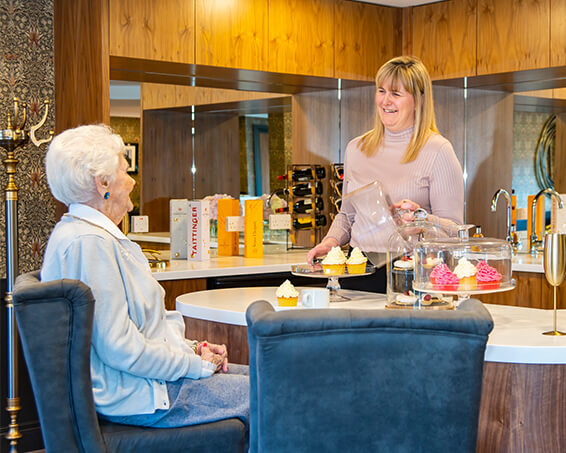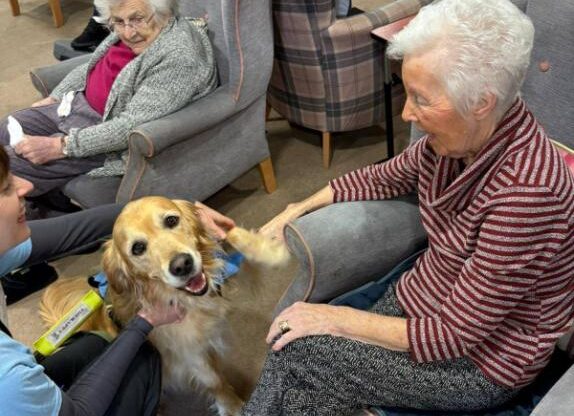What is Respite Care?

Caring for a loved one can be an incredibly rewarding experience—but it can also be physically and emotionally demanding. Whether you’re a full-time carer for a parent, partner, child, or friend, everyone needs a break now and again. That’s where respite care comes in.
So, what is respite care, exactly? Respite care is short-term care that allows a regular carer—often a family member or close friend—to take a break from caring. During this time, a paid carer or care team steps in to look after the person you care for, either at home, in a care home, or another setting. This gives carers time to rest, recover, or attend to other responsibilities without compromising the safety or wellbeing of their loved one.
At Bothwell Castle Care Home, we understand the importance of high-quality respite services and are proud to offer flexible, compassionate support for individuals and their families.
Who Can Benefit from Respite Care?
Family Carers
Family members providing all the care for someone—whether due to age, disability, or mental health conditions—are often at risk of burnout. Respite care offers a short break from these caring responsibilities, helping carers recharge while knowing their loved one is in safe hands. It can also be a lifeline for carers juggling work, other children, or personal commitments.

The Person Receiving Care
It’s not just carers who benefit. The person you look after also gains from a change of scene, new social interactions, and access to specialist support. For older adults, a respite stay at a care home can provide companionship and stimulation, particularly if they are isolated or living with dementia.
Friends and Family
Friends and family of the main carer may also gain peace of mind, especially during emergency respite care situations—when unexpected illness or circumstances mean the main carer is suddenly unavailable. Having a plan ahead for such scenarios ensures continuity of care without unnecessary stress.
Different Types of Respite Care
Respite care comes in various forms, tailored to suit individual needs, preferences, and circumstances.
Residential Respite Care
Often provided in a care home setting like Bothwell Castle, residential respite involves the person staying in a care facility for a set period. This could range from a few hours to several weeks. It's a popular option for those needing more intensive support, such as assistance with mobility, personal care, or medication.
Day Care Centres
Day care centres offer temporary care during the day, usually for older adults or those with disabilities. They provide meals, activities, and companionship in a safe, supportive environment. This gives carers a chance to work, run errands, or simply rest, knowing their loved one is enjoying meaningful engagement elsewhere.
Home-Based Respite Care
Provided by homecare agencies, homecare respite allows a paid carer to come into the person’s home. This can range from a few hours of sitting services to full overnight support. It’s ideal for individuals who prefer to stay in familiar surroundings or require minimal disruption to their routine.
Supported Holidays and Breaks
For some, supported holidays offer a welcome change of pace. These are structured vacations with care staff available to support individuals, giving both the person receiving care and their carer a well-deserved rest.
How to Arrange Respite Care
There are several routes to arrange respite care, depending on your circumstances.
Via Your Local Council
Your local authority can help you find and fund respite care, but this usually starts with a needs assessment for the person requiring care, and a carer’s assessment for the carer. These assessments look at what type of help is needed, how often, and whether you qualify for council funding or a personal budget.
If you're on a low income, you may be eligible for help covering costs. The local council may also assist with day care centres home care or replacement care services.
Self-Funded or Private Respite
Many families opt to fund their own respite care. This gives more flexibility over the choice of care home or agency, and often allows faster access than council-funded options. At Bothwell Castle, we offer a variety of packages to suit both short- and medium-term stays.
Charities and Other Support Organisations
There are several charities and other support groups that help carers find respite care options. Some may offer subsidised breaks, peer support, or advice on financial entitlements like the carer’s allowance.
Emergency Respite Care
Sometimes, the need for respite comes without warning. Perhaps a carer is taken ill or has an urgent commitment. Emergency respite care is designed for such situations, ensuring the person you care for continues to receive professional support with minimal disruption.
It’s wise to discuss this with your social worker or include an emergency plan in your care plan. At Bothwell Castle, we offer emergency placements where possible, giving families peace of mind during unforeseen circumstances.

Financial Support and Considerations
The cost of respite care varies depending on the type and duration. If you're exploring options through your local council, a financial assessment will determine what level of council funding you’re eligible for. This may include support for day care, homecare, or a short stay in a care home.
If you're ineligible for full funding, you may still receive partial assistance through a personal budget, which gives you more control over how to spend the funds.
Those receiving benefits like carer’s allowance should also check how respite arrangements might impact their entitlement. While taking a short break doesn’t usually affect benefits, extended periods may require notification.
Planning Ahead for Respite
Like many aspects of care, it’s best to plan ahead for respite. This allows you to explore suitable providers, understand funding, and introduce your loved one gradually to new carers or settings.
At Bothwell Castle Care Home, we encourage families to tour our facilities, meet our team, and discuss preferences before any respite stay begins. This helps ease transitions and ensures a positive experience for everyone involved.
Choosing the Right Respite Care Option
Every family is different, and there’s no one-size-fits-all solution. When considering respite services, ask yourself:
- Does your loved one prefer staying at home or enjoy social interaction in a group setting?
- How much support is required—just sitting services for a few hours, or short term care involving personal assistance?
- Do you need help immediately, or can you schedule a short break in advance?
- What funding or other support is available to you?
A good respite care provider will listen to your needs and tailor a plan accordingly. At Bothwell Castle Care Home, we pride ourselves on flexible, compassionate services that prioritise wellbeing and dignity.
Supporting the Wellbeing of Carers and Families
Respite care isn’t just about filling in the gaps—it’s about valuing the contribution of carers and protecting their health and wellbeing. When carers are supported, everyone benefits.
Families who embrace respite care often report better relationships, improved mental health, and reduced stress. Children caring for parents, spouses supporting partners with dementia, and even other carers all find that a little time away makes a big difference.

Why Choose Bothwell Castle Care Home for Respite?
Our home offers a safe, welcoming environment with expertly trained staff, engaging activities, and nutritious meals. Whether you need help for a few hours, a weekend, or a few weeks, we’re here to support you and your loved one.
We provide:
- Personalised care tailored to individual needs
- Comfortable en-suite accommodation
- 24/7 nursing and care support
- Social and recreational activities
- Freshly prepared meals and snacks
- Flexible booking options, including emergency respite care
Let us help you take a break with confidence—knowing your loved one is cared for with compassion and professionalism.
Whether you're exploring respite for the first time or have used it before, remember that asking for help is a strength, not a weakness. By embracing respite care, you’re not only supporting your own wellbeing but also enriching the life of the person you look after.
For more information or to arrange respite care at Bothwell Castle Care Home, get in touch with our friendly team today. Let us help you find the right balance between caring for others—and caring for yourself.





